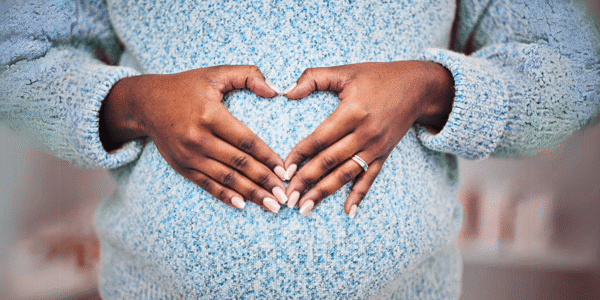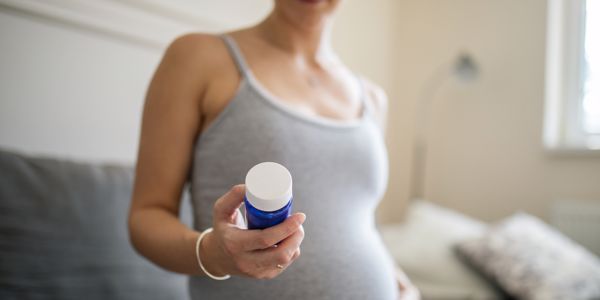Calcium is important whether you’re pregnant or not, but for expectant mothers, it’s essential. Calcium is vital during pregnancy to ensure that your baby’s teeth and bones develop properly, as well as maintaining your skeletal health.
Here’s everything you need to know about calcium during pregnancy.
Why Is Calcium Important in Pregnancy?
Calcium is important for your baby as it helps strengthen your baby’s bones and teeth. It also helps develop a normal heart rhythm and blood-clotting abilities, Alongside boosting heart, muscle and nerve development. It is also just as important for you as calcium can reduce your risk of preeclampsia and hypertension.
During the third trimester, your baby’s bone development peaks between 250 to 350 milligrams per day. If you aren’t consuming enough calcium for you and your growing baby, your body will deplete its own stores, taking what your baby needs from you.
Your body taking what it needs from your own calcium stores puts you at a higher risk of bone loss during pregnancy. This can then make you more susceptible to osteoporosis (brittle bones disease) later in life.
While it is true that most women recover lost bone mass after birth and once they’ve stopped breastfeeding, it is a good idea to increase your calcium consumption during pregnancy.
How Much Calcium Do You Need in Pregnancy?
Regardless of whether you are pregnant, breastfeeding or neither. Women need the same amount of calcium each day, though the amount of calcium women need varies based on age:
- Women aged 19-50 need around 1,000mg (milligrams) of calcium per day - which equates to about four servings of calcium rich food daily.
- Women aged 18 and younger need 1,300mg of calcium per day.
Calcium Supplements During Pregnancy
Prenatal vitamins do contain calcium, but one daily dose alone is not enough to meet the recommended 1,000 milligrams of calcium a day. The amount of calcium in prenatal vitamins vary, with most contain only around 100-200mg.
The most common form calcium supplements come in are either calcium carbonate or calcium citrate.
Calcium carbonate provides the greatest amount of calcium, but is best taken alongside a meal as it requires more stomach acid because it is harder to dissolve.
Calcium citrate is easily absorbed by the body and can be taken between meals as it doesn’t require stomach acid for absorption. This is a good choice for those how take antacids (heartburn medication) as they reduce the levels of stomach acid.
The best way to meet the recommended calcium intake each day is by eating a healthy, balanced diet - Consuming foods like yoghurt, cheese, milk, green leafy vegetables etc each day, alongside your vitamins will help boost your daily intake.
What Happens if I Have Too Much Calcium?
It is really important that you’re mindful of your calcium intake. Your total from food, supplements and water should be no higher than 2500mg (if you’re 19-50) or 3000mg (if you’re 18 or below).
Too much calcium can cause digestive issues such as constipation, poor appetite, nausea and vomiting. It can also make you more thirsty, increase urine output and cause problems with your kidneys alongside many other things.
The following are examples of different foods containing calcium (dairy, non-dairy and vegan):
Your Baby Club and Center Parcs are giving you a chance to win a family break in a Woodland Lodge at a UK Center Parcs village of your choice.
Calcium Rich Foods - Dairy:
- Skimmed milk - 260mg per 200ml
- Semi-skimmed milk - 248g per 200ml
- Whole milk - 248g per 200ml
- Low fat plain yoghurt - 130mg per 80g
- Greek style plain yoghurt - 113mg per 90g
- Cheddar cheese - 222mg per 30g
- Mozzarella - 109mg per 30g
- Cheddar cheese - 307mg per 1.5oz
Calcium Rich Foods - Non-Dairy:
- Fortified soya drink - 240mg per 200ml
- White bread - 127mg per 2 slices
- Brown bread - 134mg per 2 slices
- Dried figs - 92mg per 2 dried figs
- Watercress - 136mg per 1 bowl
- Chia seeds - 179mg per 1oz
- Bok choy - 160mg per 1 cup
- Canned Salmon - 181mg per 3oz
- Sardines - 325mg per 3oz canned with bones in oil
- White bread - 127mg per 2 slices
- Brown bread - 134mg per 2 slices
Calcium Rich Foods - Vegan:
- Fortified soya drink - 240mg per glass
- Sesame seeds - 80mg per 1 tablespoon (12g)
- Curly kale - 120mg per 80g
- Collard greens - 266mg per 1 cup
- Broccoli - 21mg per ½ cup
- Turnip greens - 148mg per 1 cup
- Tofu - 253mg per 1/2 cup (made with calcium sulfate)







